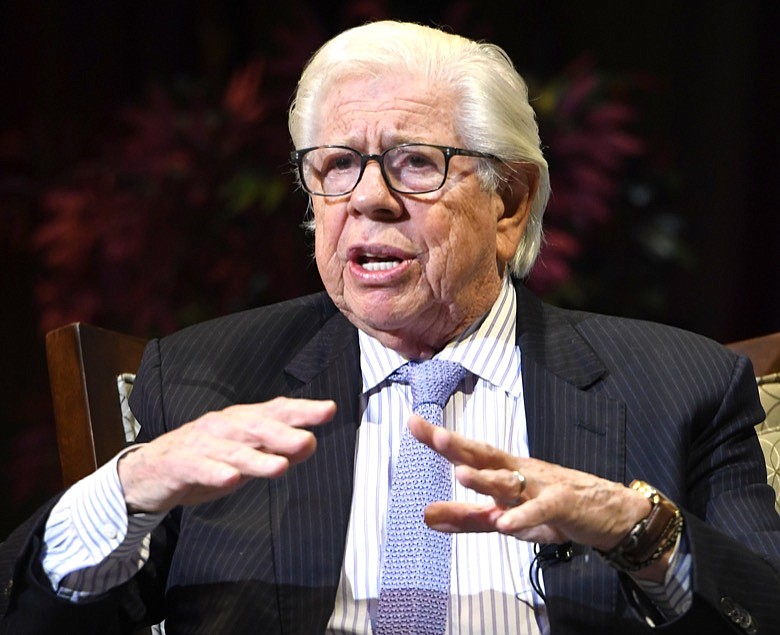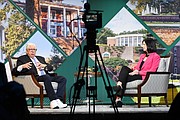One of the journalists who helped uncover the campaign abuses that led to the resignation of then-President Richard Nixon nearly a half-century ago said Thursday he believes former President Donald Trump has attempted to commit even more serious abuses of America's electoral process.
"Donald Trump is the first seditious president in the history of the United States," Pulitzer Prize-winning journalist Carl Bernstein said Thursday night in an appearance at Southern Adventist University. "That is a bold, bold statement, but look at what Donald Trump did and look at the facts that we are seeing coming out."
In a talk on "Why Truth Still Matters" before several hundred people in Collegedale, the 78-year-old author and former reporter for The Washington Post said Trump's abuse of power was even more serious than what Bernstein and fellow Washington Post reporter Bob Woodward wrote about regarding Nixon's re-election efforts in 1972.
Bernstein said Trump's attempt to overturn the results of the 2020 presidential election and his initial encouragement of those who stormed the U.S. Capitol was "a deception that exceeded even Nixon's imagination."
In the Watergate scandal, the evidence that emerged of the political spying and espionage in Nixon's campaign ultimately led to Republicans calling for Nixon's resignation. Bernstein praised former Tennessee Republican Sen. Howard Baker for pursuing the truth in the Watergate hearings by demanding to know "what the president knew and when he knew it."
"The real heroes of Watergate were the Republicans," Bernstein said during a discussion with Alison Lebovitz taped before a live audience for an upcoming show on the PBS affiliate WTCI-TV.
In February 1973, when questions surfaced about Nixon's Committee to Re-Elect the President, the U.S. Senate voted 77–0 to create the Select Committee on Presidential Campaign Activities, which ultimately led all but a handful of GOP senators to urge Nixon to resign, which he did in August 1974.
In contrast, most Republicans opposed the makeup and process used by the Jan. 6 committee in Congress that is investigating the attack on the U.S. Capitol and any White House ties to the attack.
Bernstein told his Southern Adventist University audience about how Sen. Barry Goldwater, the former Republican presidential nominee, told Nixon in 1974 that he had only four or five votes not to impeach -- and they didn't include Goldwater or Baker.
GOP members in the current Congress have been more supportive of Trump, at least so far, Bernstein said. But the veteran journalist said he thinks after the midterm elections, in which several Trump-backed candidates were defeated, many party leaders are likely to back away from the former president.
In Tennessee, Trump has remained popular, winning nearly 61% of the vote in the 2020 election against Joe Biden. GOP members of Congress in Tennesee have continued to voice support for Trump and Republicans picked up another seat in Tennessee's congressional delegation in the November midterm elections and now control eight of the nine House seats in Tennessee, along with both of the U.S. Senate seats.
Bernstein said a major difference between the Nixon era and the Trump presidential term decades later is the growing mistrust in the public of most major institutions, including the news media, and the growing polarization of the electorate.
An October survey by the Gallup polling organization found just 7% of Americans have "a great deal" of trust and confidence in the media, and 27% have "a fair amount." Meanwhile, 28% of U.S. adults say they do not have very much confidence and 38% have none at all in newspapers, TV and radio.
Bernstein stressed the role of the news media has and should remain the same -- "to give the best version of the truth that we can."
That truth, Bernstein said, is not always neutral or entirely two-sided, insisting that reporters need to work harder to dig out and report what really happens and tell it like it is.
Although Bernstein said he thinks most reporters in the mainstream media are seeking to find and report the truth, many on social media and at some news outlets are not as interested in telling the truth if it doesn't conform to what they want or what gets the most viewers.
"The atmosphere in this country and the polarization we're seeing is because there is not an openness to the truth similar to a couple of generations ago," Bernstein said. "I think Fox News is that category and is not open to the best attainable version of the truth."
Bernstein said Fox News is the most important political force in the past decade and "it has changed our politics and our culture." For all its success in attracting audiences, Bernstein said Fox News does not consistently seek the most attainable version of the truth in the way most conventional print and broadcast media have done.
Under questioning, Bernstein said other news outlets may also be biased and unfair, although he did not identify any others. Asked about MSNBC, Bernstein said "by and large it is not a reportorial enterprise," but he said the cable network of NBC news does provide strong reporting when there is a breaking news story.
For all of the challenges facing the media, Bernstein urged journalists at Southern to get into the business, which he called exciting, interesting and important.
Bernstein, who began his reporting career at age 16 as a copy boy for the Washington Star, said he had enjoyed a front-row seat to American politics in Washington, D.C., throughout his life.
Bernstein's talk, which will be featured on the A List with Alison Lebovtiz on WTCI-TV, was also the first in a new lecture series that will invite prominent journalists and top communication professionals to the Southern Adventist University campus "to inspire a new generation of truth seekers and storytellers."
Contact Dave Flessner at dflessner@timesfreepress.com or 423-757-6340. Follow him on Twitter @DFlessner1.

